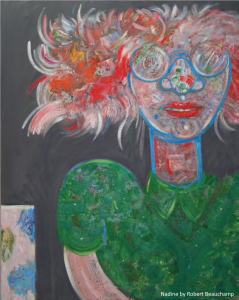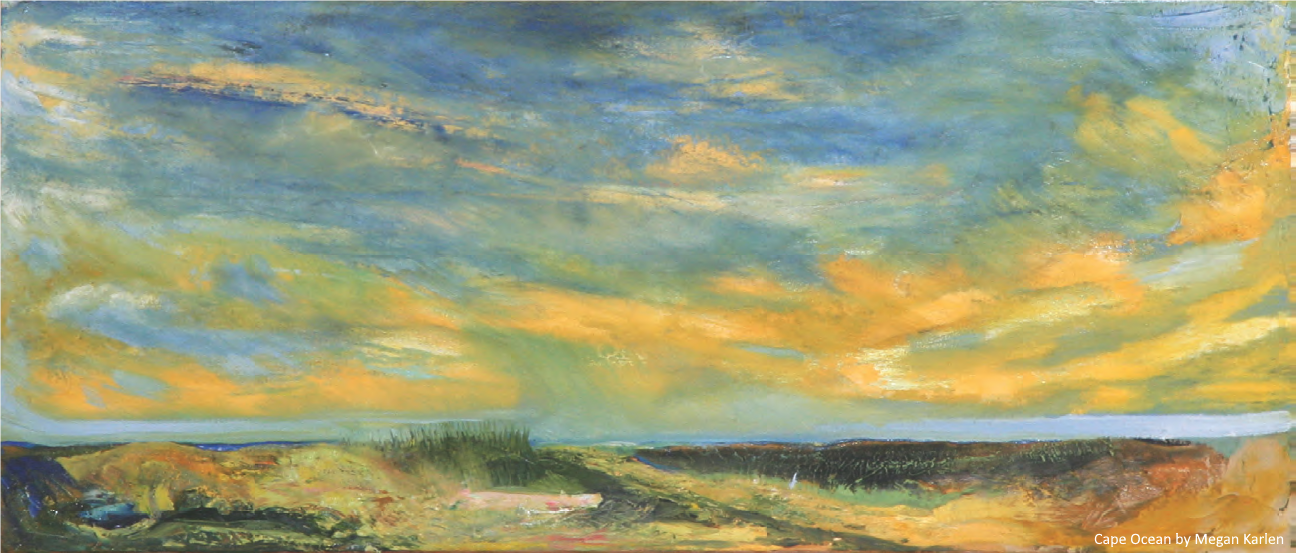Buying art means buying smart. So what’s the deal with your neighborhood gallery?
In the typical suburban New Jersey home, you’re more likely to find a good guy named Art than good art. That’s fine if your goal is to own an undistinguished sofa-sized oil. But what if you want fine art—the kind that will brighten your life and fatten your bottom line? The answer may be as close as your local gallery. For those who believe you have to cross the Hudson to find investment-grade art, this idea may go against the grain. But the fact is that building a relationship with a gallery (or galleries) here in the Garden State can yield a far greater return—not just in terms of value and quality, but in so many other ways. This applies to the seasoned collector as well as the novice. In fact, if you’re like so many New Jerseyans, the thought of opening your checkbook in a local art gallery is nothing short of terrifying. First things first. Let’s wrap our minds around the reasons New Jerseyans don’t buy art. Above all there is the intimidation factor. Most people are afraid they’ll be taken to the cleaners by an unscrupulous gallery owner.
That’s fine if your goal is to own an undistinguished sofa-sized oil. But what if you want fine art—the kind that will brighten your life and fatten your bottom line? The answer may be as close as your local gallery. For those who believe you have to cross the Hudson to find investment-grade art, this idea may go against the grain. But the fact is that building a relationship with a gallery (or galleries) here in the Garden State can yield a far greater return—not just in terms of value and quality, but in so many other ways. This applies to the seasoned collector as well as the novice. In fact, if you’re like so many New Jerseyans, the thought of opening your checkbook in a local art gallery is nothing short of terrifying. First things first. Let’s wrap our minds around the reasons New Jerseyans don’t buy art. Above all there is the intimidation factor. Most people are afraid they’ll be taken to the cleaners by an unscrupulous gallery owner. Second, they are nervous that their friends will make fun of a purchase that is different and modern, or simply out of character. Feeding this double-barreled paranoia is the fact that—particularly in the case of an abstract piece—one cannot specifically define the level of talent and technical skill involved in producing modern art. And on top of these very legitimate fears is the great, big elephant in the room: Why, when New York City is so close, would anyone buy art in New Jersey in the first place? Permit me to deal with this last objection first. Galleries here in New Jersey are indeed different than most galleries in the city. That is to say that they are friendly and approachable. If you think about it, it makes complete sense. Gallery owners are where they are, and do what they do, because they love and appreciate art. If they were in this business to make a killing, I hate to say it but they would be in Manhattan. What else does New Jersey have to offer art buyers that the city doesn’t? Well, there is a lot of first-rate talent that, for one reason or another, is only shown on this side of the Hudson.
Second, they are nervous that their friends will make fun of a purchase that is different and modern, or simply out of character. Feeding this double-barreled paranoia is the fact that—particularly in the case of an abstract piece—one cannot specifically define the level of talent and technical skill involved in producing modern art. And on top of these very legitimate fears is the great, big elephant in the room: Why, when New York City is so close, would anyone buy art in New Jersey in the first place? Permit me to deal with this last objection first. Galleries here in New Jersey are indeed different than most galleries in the city. That is to say that they are friendly and approachable. If you think about it, it makes complete sense. Gallery owners are where they are, and do what they do, because they love and appreciate art. If they were in this business to make a killing, I hate to say it but they would be in Manhattan. What else does New Jersey have to offer art buyers that the city doesn’t? Well, there is a lot of first-rate talent that, for one reason or another, is only shown on this side of the Hudson.  There is no comparison in terms of service. Try walking into a gallery on West Broadway or Madison Avenue and asking the owner to drive out to your place in Westfield for a consultation. That thud is the sound of his jaw hitting the floor. A gallery owner in or around your town, on the other hand, will likely welcome this opportunity. New Jersey art dealers are genuinely interested in the people who live around them, and cultivating relationships that extend beyond the buying and selling of art. They are part of the fabric of the community. Connecting with a local gallery also happens to be a superb way of adding texture to your social life. Once you’re “on the list” you’ll be invited to opening receptions whenever a new artist is featured. How often do you get to mix and mingle with new people who just happen to share a common interest? The majority of people attending gallery openings are like you—they want to know more about art and the people who buy it. (By the way, a free wine-and-cheese gathering is a wonderful springboard to dinner, a movie, or whatever else you’ve planned for an evening out.) Okay, so what about the financial side of the gallery relationship? Now more than ever, as we balance the merits of saving and spending, it is important to know what you get for your money when you purchase a work of art. Whether the price tag is several hundred or several thousand, dealers who live and work nearby are unlikely to “rip off” customers; they have reputations to uphold. If you happen to be one of the fortunate few who have five or six figures to invest in art, a good dealer will have solid connections to galleries that can point you in the right direction (and more importantly, steer you clear of the wrong direction). Either way, if your appreciation of art is tied to its potential appreciation, make that clear to the gallery owners you deal with.
There is no comparison in terms of service. Try walking into a gallery on West Broadway or Madison Avenue and asking the owner to drive out to your place in Westfield for a consultation. That thud is the sound of his jaw hitting the floor. A gallery owner in or around your town, on the other hand, will likely welcome this opportunity. New Jersey art dealers are genuinely interested in the people who live around them, and cultivating relationships that extend beyond the buying and selling of art. They are part of the fabric of the community. Connecting with a local gallery also happens to be a superb way of adding texture to your social life. Once you’re “on the list” you’ll be invited to opening receptions whenever a new artist is featured. How often do you get to mix and mingle with new people who just happen to share a common interest? The majority of people attending gallery openings are like you—they want to know more about art and the people who buy it. (By the way, a free wine-and-cheese gathering is a wonderful springboard to dinner, a movie, or whatever else you’ve planned for an evening out.) Okay, so what about the financial side of the gallery relationship? Now more than ever, as we balance the merits of saving and spending, it is important to know what you get for your money when you purchase a work of art. Whether the price tag is several hundred or several thousand, dealers who live and work nearby are unlikely to “rip off” customers; they have reputations to uphold. If you happen to be one of the fortunate few who have five or six figures to invest in art, a good dealer will have solid connections to galleries that can point you in the right direction (and more importantly, steer you clear of the wrong direction). Either way, if your appreciation of art is tied to its potential appreciation, make that clear to the gallery owners you deal with. They will help you assess potential purchases (or emerging artists) with that goal in mind. Another advantage to buying in New Jersey—besides the good feeling that comes with supporting a local business— is that gallery owners here may be much more likely to work a deal that fits your finances. Their overhead is lower than in the city, which may translate into wiggle room when you whip out the checkbook. Finally, keep in mind as you shop or budget for fine art that you are buying something that could turn out to be a family treasure. Art is timeless. Art is priceless. Unlike a sofa or granite countertop, it does not depreciate the moment it walks through your front door. If you’ve chosen wisely, in fact, it could appreciate dramatically. And as it moves from your home to your children’s, and then to your children’s children’s and beyond, it serves as a link between the generations. In the meantime, this investment will enhance your quality of life every time you fix your gaze upon it. Indeed, as Pablo Picasso once observed, art “washes away from the soul the dust of everyday life.” Amen to that. Some other art icons have also had a thing or two to say on the subject. Jackson Pollock famously noted that every good painter paints what he is. Rembrandt suggested practicing what you know to make clear what now you do not know. Believe it or not, Michelangelo often insisted, I can actually draw. Clarity and simplicity enabled these great painters to create magnificently complex works of art. When it comes to buying art in the Garden State, a little clarity and simplicity also goes a long way. EDGE
They will help you assess potential purchases (or emerging artists) with that goal in mind. Another advantage to buying in New Jersey—besides the good feeling that comes with supporting a local business— is that gallery owners here may be much more likely to work a deal that fits your finances. Their overhead is lower than in the city, which may translate into wiggle room when you whip out the checkbook. Finally, keep in mind as you shop or budget for fine art that you are buying something that could turn out to be a family treasure. Art is timeless. Art is priceless. Unlike a sofa or granite countertop, it does not depreciate the moment it walks through your front door. If you’ve chosen wisely, in fact, it could appreciate dramatically. And as it moves from your home to your children’s, and then to your children’s children’s and beyond, it serves as a link between the generations. In the meantime, this investment will enhance your quality of life every time you fix your gaze upon it. Indeed, as Pablo Picasso once observed, art “washes away from the soul the dust of everyday life.” Amen to that. Some other art icons have also had a thing or two to say on the subject. Jackson Pollock famously noted that every good painter paints what he is. Rembrandt suggested practicing what you know to make clear what now you do not know. Believe it or not, Michelangelo often insisted, I can actually draw. Clarity and simplicity enabled these great painters to create magnificently complex works of art. When it comes to buying art in the Garden State, a little clarity and simplicity also goes a long way. EDGE
Editor’s Note: Kathy Donnelly is an art collector and dealer. She owns Beauregard Fine Art Gallery (beauregardfineart.com) in Rumson.





